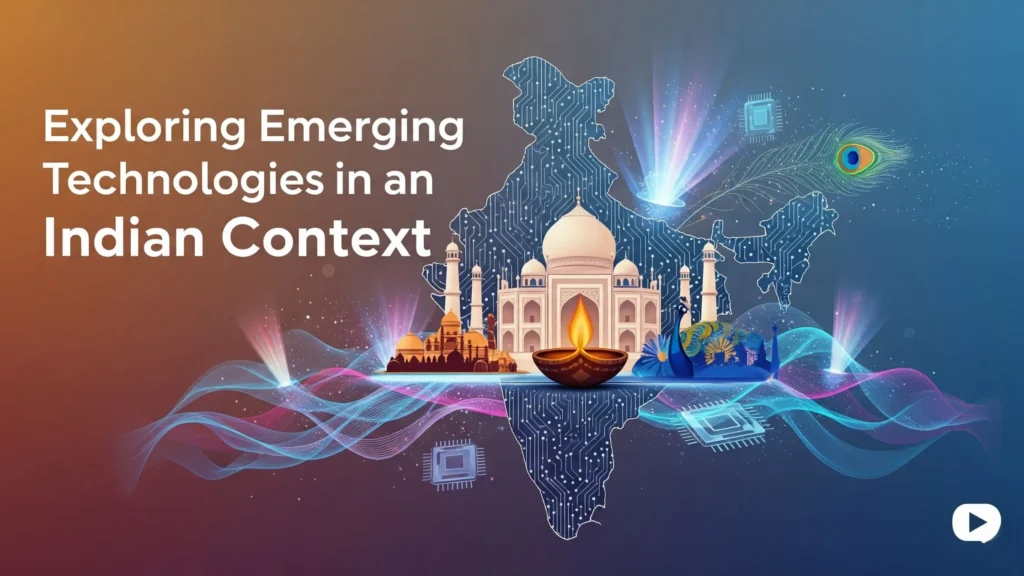Exploring Emerging Technologies in an Indian Context
India stands at the crossroads of a technological revolution. Emerging technologies such as artificial intelligence (AI), blockchain, Internet of Things (IoT), 5G, and augmented/virtual reality (AR/VR) are rapidly reshaping how Indians live, work, and do business. As the world’s fifth-largest economy and home to a massive young population, India is uniquely positioned to harness these innovations for economic growth and social development.
Artificial Intelligence: Transforming Everyday Life
AI is no longer limited to research labs—it’s finding its way into everything from customer service chatbots to advanced healthcare diagnostics. In India:
- Healthcare: AI-powered tools are helping doctors detect diseases earlier and improve patient outcomes. For example, AI algorithms can analyze X-rays and MRIs faster than human radiologists.
- Agriculture: AI-based predictive analytics assist farmers in understanding weather patterns, soil health, and crop diseases.
- Education: EdTech platforms use AI to personalize learning, helping students grasp concepts at their own pace.
The government’s AI for All initiative aims to promote AI adoption across sectors, ensuring that the benefits reach both urban and rural populations.
Blockchain: Beyond Cryptocurrency
While blockchain is often associated with Bitcoin and other cryptocurrencies, its potential extends much further. In India:
- Supply chain management: Blockchain can track goods from production to delivery, improving transparency and reducing fraud.
- Digital identity: It can create secure, tamper-proof IDs for citizens, complementing initiatives like Aadhaar.
- Voting systems: Blockchain-based voting could enhance transparency and reduce electoral fraud.
Several Indian startups are experimenting with blockchain for agriculture, banking, and healthcare, signaling a growing interest in decentralized solutions.
Internet of Things (IoT): Smarter Homes and Cities
IoT devices—ranging from smart light bulbs to connected industrial sensors—are becoming more common in India.
- Smart homes: Urban households are adopting IoT for energy savings, convenience, and enhanced security.
- Smart cities: Government-led projects under the Smart Cities Mission use IoT to manage traffic, monitor pollution, and optimize public services.
- Industrial IoT: Manufacturing units use connected sensors to monitor equipment, predict failures, and improve efficiency.
The rollout of 5G will further enhance IoT adoption by enabling faster and more reliable device connectivity.
5G Connectivity: Enabler of Next-Gen Solutions
The launch of 5G services in India marks a significant step toward enabling emerging technologies. With ultra-low latency and high-speed internet, 5G will power:
- Real-time telemedicine consultations in rural areas
- High-quality video streaming for education and entertainment
- AR/VR applications for training, gaming, and design
- Connected vehicles and smart transportation systems
Reliance Jio, Bharti Airtel, and Vodafone Idea are already rolling out 5G networks across major Indian cities, with rural expansion on the horizon.
AR and VR: Immersive Experiences
AR and VR are transforming industries beyond gaming:
- Retail: Virtual try-ons for clothing, eyewear, and furniture shopping are becoming popular among Indian e-commerce platforms.
- Education: Students can explore 3D simulations of scientific concepts, historical monuments, or even space exploration.
- Tourism: Virtual tours of heritage sites and natural wonders help promote travel while preserving resources.
Challenges in Adoption
Despite the promise of emerging technologies, India faces hurdles:
- Digital literacy: Many citizens lack awareness and skills to use advanced technologies effectively.
- Infrastructure gaps: Rural connectivity and electricity supply issues can slow adoption.
- Cost barriers: High costs of devices and solutions limit accessibility for lower-income households and small businesses.
- Data privacy concerns: Stronger regulations are needed to protect personal and organizational data.
The Road Ahead
India’s unique combination of a young tech-savvy population, supportive government policies, and a growing startup ecosystem positions it as a potential global leader in emerging technologies. By addressing challenges and focusing on affordable, inclusive innovation, India can ensure that these technologies benefit every citizen—whether it’s a farmer using AI for crop prediction or a factory using IoT to cut waste.
As we move forward, the integration of these technologies will not just drive economic growth but also improve quality of life, making India a truly digital-first nation.



